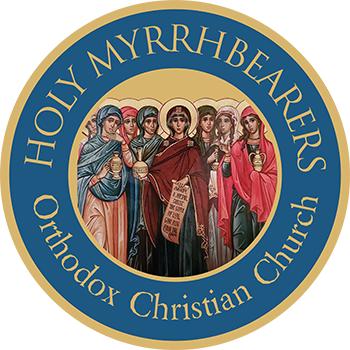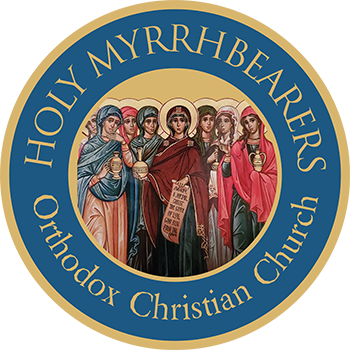There are three great beginnings in the life of Christ. The first two of those three, we celebrate in this single festal season – His birth and His baptism. With His birth we see the beginning of His earthly life, the fulfillment of the words of the Gospel of St John, “and the Word became flesh and dwelt among us.” In His baptism, we see the beginning of his earthly ministry and work, crowning in His death and Resurrection, which complete our redemption. His Glorious Resurrection is the third great beginning for it is the founding of His immortal kingdom. Each of these beginnings was proclaimed by a herald: His birth by the heavens and the angelic host; His baptism by the Great Prophet Forerunner and Baptist John; His Resurrection by the Myrrh-bearing women. Today, in the Gospel of Mark, we stand on the threshold of His baptism, we see the coming of the herald of this event – John the Forerunner.
St John was the one foretold by the prophets as “the voice of one crying in the wilderness, Prepare ye the way of the Lord, make his paths straight”. This John prepared all, by preaching repentance and baptizing for the remission of sins. The heart of the message of the Baptist is, repentance — for it is by means of repentance that we “make straight the way of the Lord” in our hearts and lives. It is by means of our repentance that we are granted forgiveness of sins.
What then, is repentance, and how does it accomplish these things in us? Repentance is more than just feeling sorry for our sins. Sorrow for ours sins is a good thing – in fact from the Beatitudes we just sang, “Blessed are those who weep and mourn for they shall be comforted” –but sorrow by itself isn’t enough; it doesn’t establish repentance. Notice that the Beatitude itself, tells us that the one who sorrows (i.e. “is sorry”), and ‘weep and mourn’, will be comforted, but does not mention forgiveness.
However, sorrow for our sins, does open the door or path to repentance, because it is born out of a desire to draw near to God, and the realization that we are so far from Him, and that we are increasing that distance every moment by our own sins, ours, not someone else’s.
When we see that we are far from God, and that we ourselves do nothing more than intensify the situation, then our response is sorrow. Depending on the strength of our love for God, we weep and mourn for our sin.
In fact the ascetic fathers tell us that without tears, we cannot truly repent. Sorrow for our sins, leads us to repentance, but in order to truly repent, there must be something more than just feeling sorry for yourself.
Repentance begins with sorrow, but then it also encompasses the idea of “turning away”. To repent, means to turn away from the things that we no longer desire to have in our lives. If I repent of my sins, that means that, in as much as it is in my power, I will turn my back on those sins and all the things that they entail. To fully repent means to purge my life not only of those things that are sins, but those things which lead up to sin and which result from it as well. Repentance is a total turning away from my old way of life that leads away from God, and creates distance from Him, and taking on instead a new way of life that is in harmony with Him. Our own senses: hearing, smelling, seeing, touching, and tasting, let sin into our heart and lives. This is work! Are you, we, willing to work!
This aspect of repentance clarifies the call of the Forerunner to “Prepare ye the way of the Lord, make His paths straight” in my own life. By repenting, I reject the twists and turns away from the “straight and narrow” path of salvation. I make my own life “straight” so that I may more easily walk with the Lord on the path that He provides for each of us. By repenting I “deny myself” and my own ideas and thoughts about the spiritual life as well as my own judgments about what is good and evil and instead commit myself by faith, to follow the path of salvation given by our Lord Jesus Christ, to each and every one of us.
This path is laid out for us in the Gospels, in the life of the Church, and demonstrated in the lives of the Saints. This “straightening” is not our salvation, but it is the preparation to receive our salvation from He Who provides it. This is work! Are you, we, willing to work!
St John not only called for the people to make an interior decision to change their way of life, but he also called for outward actions to verify that way of life. It is not enough just to want to follow Christ in our lives; it is necessary to actually follow Him and that means action. The Baptist John made use of a Hebrew ritual tradition by which a person who was unclean was made ritually clean by bathing. This ritual bathing was the baptism which John conferred “for the remission of sins.”
He himself could not forgive sins, as the Gospel reminds us, only God can forgive sins, and so this baptism was not the same as the Baptism of our Lord, which does in fact cleanse us from our sins, and is the means by which we are reborn. The baptism of John was a symbolic act indicating the decision and intent to repent from that moment forward. The link between repentance and this Mystery of Baptism, demonstrates for us the power of repentance – for it is by repenting and turning away from our sin that we are forgiven our sins by God. He sees the intent and desire of the heart to repent, and He sees by our actions, that we have indeed repented and He forgives us simply by reaching out His hand to us and bestowing upon us His grace, which acts upon us to cleanse us from our former sins and strengthens us to follow through on our true repentance.
This is the same thing that happens to us in the Sacrament of Confession. When we confess our sins, God Himself hears us and in His infinite compassion, forgives our sins, breaking the power that the sin has on us. He then bestows upon us His grace, which acts to heal the wounds that sin has inflicted upon the soul, and to strengthen us to resist the temptation that will surely come, to return to that sin.
In fact the tears of repentance that one sheds in the sacrament of confession are often likened by the ascetic fathers to a second baptism which washes the soul clean again. True Repentance, This is work! Are you, we, willing to work!
Today we heard the cry of the Forerunner to “prepare the way of the Lord”. The means by which we do this in our lives is by repentance. When we repent, we turn our back on those things we see and do in our lives, which lead us away from God – that we turn from our sins.
It’s not merely regret or being sorry for what we have done, but a rejection of the way of life that brought about our sin, as well as a rejection of the sin itself. Repentance means taking on a new way of life, a life that is in harmony with the life of Christ. Repentance also must be translated into action – it cannot just remain an inner intent or desire, but is something upon which we act. Not things we just repeat week after week during Confession.
A genuine change, in how we act, and what we do, and in our way of life, is a necessary and vital component of true repentance. When God sees this true repentance in us, He Himself reaches out to us and pours out upon us His grace of forgiveness, which also enables and empowers us to follow Him.
Having been baptized into Christ and having put on Christ, we are now cleansed and born anew. This is the start of our new life, our life in Christ brought about and maintained by repentance – it is the life to which we are called by the cry of the Forerunner to “Repent for the Kingdom of Heaven is at hand.”
Today, at the beginning of that path, leading us from Nativity to Pascha, the Church reminds us of that beginning, that we must live every day through repentance and of that determination with which, we must seek the Kingdom of God. The Church also reminds us that Christ is always with us, that the Kingdom of God is always near us, and that it depends only upon us whether we shall attain that goal and whether we will follow this path to its end, and receive that crown that the Lord Jesus Christ has prepared for each one of us.
So again, I say and ask — This is work! Are you, we, willing to work!





